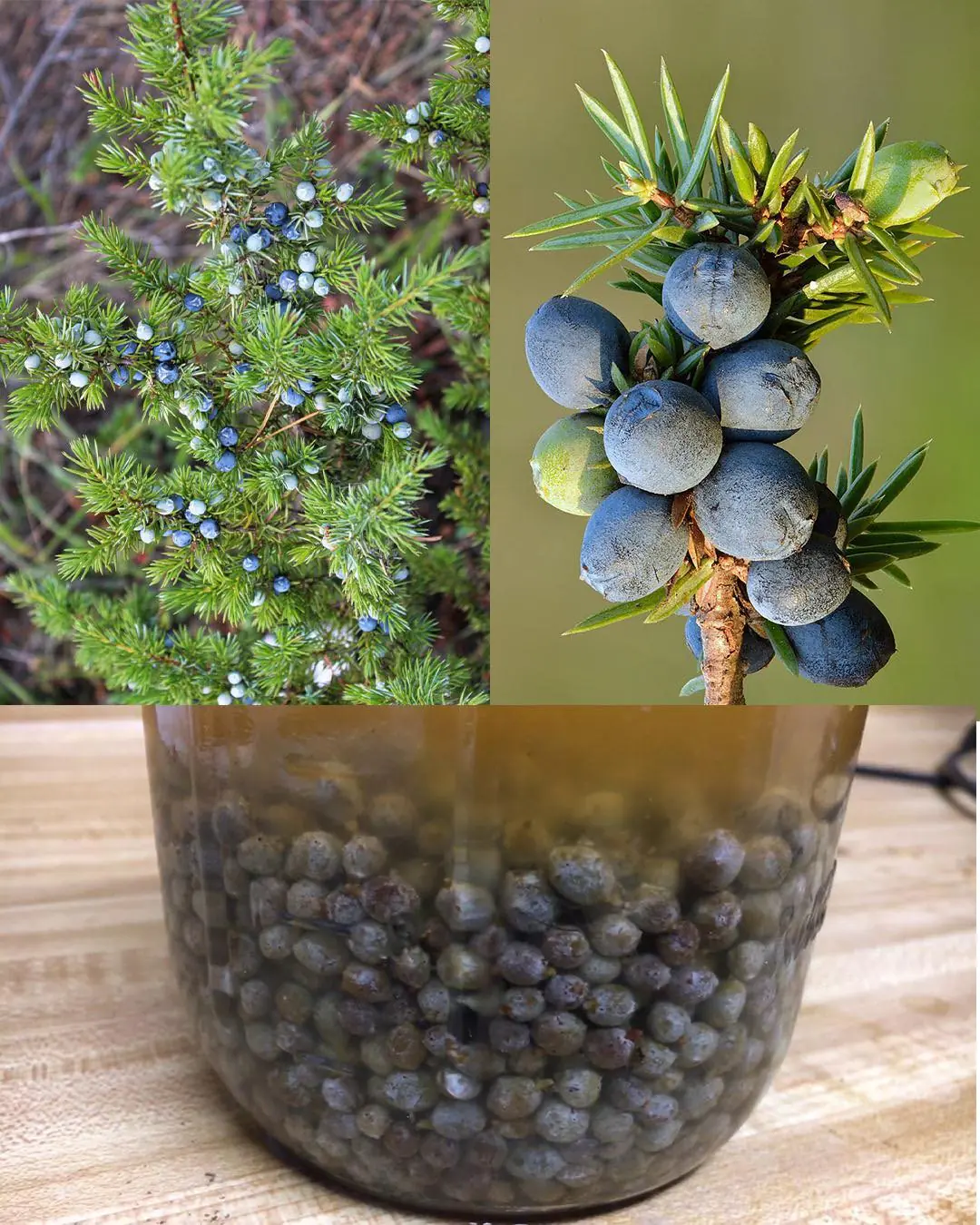
Juniper: 20 remarkable benefits and how to use it

Juniper - with its fresh, pine-like aroma and sharp, slightly sweet flavor - has been treasured for centuries as both a culinary spice and a healing herb. The small blue-purple berries of the juniper plant (Juniperus communis) are far more than just the signature flavor in gin; they are packed with medicinal properties that have been valued in traditional medicine since ancient Greek and Roman times.
Modern research continues to uncover the wide-ranging benefits of juniper berries, essential oil, and tea. From boosting digestion to improving skin health, juniper is a powerful plant ally you’ll want to know more about.
What Is Juniper?
Juniper is an evergreen shrub that belongs to the cypress family (Cupressaceae) and grows across Europe, North America, and Asia. The part most commonly used for health and culinary purposes is the berry-like cone, known as the juniper berry.
These berries are rich in essential oils, antioxidants, flavonoids, and volatile compounds that give them their distinctive aroma and healing potential. Depending on how it’s prepared — dried, infused, or distilled — juniper can serve as a flavoring, a digestive aid, or even a natural antiseptic.
20 Remarkable Benefits of Juniper
Let’s explore the scientifically backed and traditionally recognized benefits of juniper and its derivatives:
1. Powerful Antioxidant Properties
Juniper berries are loaded with antioxidants like flavonoids, catechins, and limonene, which help neutralize harmful free radicals in the body. These antioxidants play a crucial role in preventing premature aging and reducing the risk of chronic diseases such as cancer, diabetes, and heart disease.
2. Supports Healthy Digestion
Juniper has long been used as a digestive tonic. The volatile oils in the berries stimulate the production of digestive enzymes, promoting better breakdown of food and easing bloating, indigestion, and gas.
3. Natural Diuretic
Juniper berries increase urine output, helping flush out excess fluids and waste from the body. This diuretic effect can reduce water retention and support kidney and bladder health - though it should be used moderately and with medical supervision if you have kidney issues.
4. Promotes Detoxification
By enhancing urinary flow and liver function, juniper helps the body eliminate toxins. Herbalists often include juniper in detox teas or cleansing blends to support natural detoxification and lymphatic drainage.
5. Improves Kidney Health
Juniper may help prevent urinary tract infections (UTIs) and kidney stones by keeping the urinary tract flushed and reducing bacterial buildup. Historically, it was used as a kidney tonic - though modern use should always involve caution for those with pre-existing kidney disorders.
6. Fights Bacteria and Fungi
Studies show that juniper berry essential oil has strong antimicrobial and antifungal properties, effective against bacteria like E. coli, Salmonella, and fungi such as Candida albicans. This makes it useful in natural cleaning solutions and topical antiseptics.
7. Supports Blood Sugar Control
Research suggests that juniper berry extracts may help improve insulin sensitivity and lower blood sugar levels. The plant’s natural compounds help regulate glucose metabolism, which could benefit people with or at risk for type 2 diabetes.
8. Boosts Immunity
Thanks to its antimicrobial and antioxidant compounds, juniper supports the immune system by fighting pathogens and reducing inflammation. Regular use of juniper tea or aromatherapy can strengthen natural defenses against common infections.
9. Eases Joint Pain and Arthritis
Juniper has anti-inflammatory and analgesic properties that make it useful in relieving joint pain, stiffness, and swelling associated with arthritis or rheumatism. Massaging diluted juniper essential oil into sore joints can bring relief and improve mobility.
10. Aids Respiratory Health
Inhaling juniper vapor or using it in aromatherapy can help clear congestion, ease coughs, and open the airways. The plant’s expectorant properties make it helpful for respiratory conditions like bronchitis or sinus infections.
11. Calms the Mind and Reduces Stress
Juniper essential oil is often used in aromatherapy to relieve mental fatigue and tension. Its earthy, grounding scent promotes emotional balance, reduces anxiety, and can even improve sleep quality when diffused before bedtime.
12. Improves Skin Health
With antibacterial and antioxidant benefits, juniper is a common ingredient in acne treatments, toners, and detoxifying face masks. It helps purify pores, reduce inflammation, and promote clearer, healthier skin.
13. Supports Heart Health
Juniper’s antioxidants, coupled with its ability to reduce fluid retention and cholesterol, may support cardiovascular health. The herb helps maintain healthy circulation and may aid in balancing blood pressure.
14. Reduces Bloating and Water Retention
Juniper’s mild diuretic properties make it effective for reducing puffiness and bloating, particularly during menstruation or after consuming salty foods. Herbal teas containing juniper are popular for this purpose.
15. Enhances Appetite and Digestion
Traditionally, juniper berries were chewed or infused in alcohol as a digestive bitters before meals to stimulate appetite and promote efficient digestion.
16. Relieves Muscle Pain
Juniper essential oil, when used topically, helps ease muscle cramps, tension, and soreness. It is commonly found in massage oils and balms designed for post-workout recovery.
17. May Aid Weight Management
By improving digestion, reducing bloating, and supporting detoxification, juniper may indirectly assist with weight management. It’s not a fat-burner but can complement a healthy diet and exercise plan.
18. Freshens Breath
Chewing dried juniper berries was a traditional way to combat bad breath. The plant’s antimicrobial compounds help kill odor-causing bacteria in the mouth.
19. Acts as a Natural Preservative
Because of its strong antibacterial nature, juniper has been used for centuries to preserve meats and alcoholic beverages. Its essential oils prevent spoilage and add a subtle aromatic flavor.
20. Supports Women’s Health
Juniper tea has been used in traditional medicine to regulate menstrual cycles, ease cramps, and support hormonal balance. However, pregnant or breastfeeding women should avoid juniper, as it can stimulate uterine contractions.
How to Use Juniper
There are many safe and effective ways to enjoy juniper’s health benefits. Here’s how to incorporate it into your daily life:
1. Juniper Tea
For detox and digestion:
-
Crush 1 teaspoon of dried juniper berries.
-
Steep in 1 cup of hot water for 10–15 minutes.
-
Strain and drink once daily.
This tea is cleansing, slightly bitter, and aromatic - perfect after heavy meals.
2. Juniper Essential Oil (Aromatherapy or Massage)
-
For relaxation: Add 3–4 drops to a diffuser.
-
For sore muscles: Dilute 3 drops of juniper oil in 1 tablespoon of carrier oil (like coconut or almond oil) and massage into affected areas.
-
For joint pain: Combine with eucalyptus or rosemary oil for enhanced effects.
(Always do a patch test before applying essential oils to skin.)
3. Juniper Berry Extract or Capsules
Supplements containing juniper berry extract are available for supporting digestion, immunity, and blood sugar balance.
-
Take only as directed - usually 200–400 mg daily.
-
Do not use continuously for more than 4 weeks without a break.
4. Culinary Uses
Juniper berries add a unique earthy, pine-sweet flavor to food and drinks:
-
Crush lightly before adding to meat marinades, sauerkraut, or roasted vegetables.
-
Use sparingly - 2-3 berries can flavor an entire dish.
-
Try them in cocktails for a gin-like aroma.
5. Juniper Bath Soak
For relaxation and detox:
-
Mix 5 drops of juniper essential oil with 1 cup of Epsom salt.
-
Add to a warm bath and soak for 20 minutes.
This helps soothe sore muscles and calm the mind.
Precautions and Side Effects
While juniper offers impressive benefits, it must be used responsibly:
-
Avoid during pregnancy or breastfeeding, as juniper can stimulate uterine activity.
-
Not suitable for people with kidney disease without medical supervision.
-
Prolonged or excessive use can irritate the kidneys.
-
Always dilute essential oils before applying to the skin.
-
If you experience nausea, rash, or dizziness, discontinue use immediately.
As with all herbs, consult a healthcare provider before using juniper therapeutically - especially if you take medications for blood sugar, blood pressure, or diuretics.
Fun Facts about Juniper
-
Juniper berries are actually modified cones, not true berries.
-
The word “gin” comes from the French genièvre, meaning “juniper.”
-
Ancient Egyptians used juniper oil in mummification rituals and incense.
-
Native American tribes burned juniper branches for purification and protection ceremonies.
Final Thoughts
Juniper is far more than just a flavoring for gin - it’s a versatile botanical treasure with centuries of healing heritage. Its blend of antioxidants, essential oils, and anti-inflammatory compounds make it a valuable ally for digestion, immunity, skin health, and overall vitality.
Whether you sip it as tea, use the essential oil for relaxation, or add a few crushed berries to your favorite meal, juniper invites you to experience the perfect harmony of aroma, taste, and wellness.
Used mindfully and with respect for its potency, juniper can bring a refreshing, natural boost to your daily health routine - one that connects you to ancient wisdom and modern wellness alike.
News in the same category


A 52-Year-Old Woman Di.ed from a Stro.ke: Middle-Aged People, Stop Doing These 7 Things

Banana Flower Superfood: Juice, Recipes & Powerful Health Benefits You Didn't Know About

Eating garlic is very good, but for these 4 groups of people, don't touch it

Gallstones are a common disease, affecting 8-10% of the population. Here are the symptoms and treatments

Important News for Everyone Who Loves a Daytime Nap

A 62-Year-Old Man Developed Col.on Can.cer Due to 3 “Har.mless” Daily Habits That Many People Have

Preventing Stroke At Any Age: 3 “Don’ts” After Meals—And 4 “Don’ts” Before Bed

Stop using these bottles and containers for food storage

10 Foods You Should Never Eat on an Empty Stomach

4 Types of Itching That May Signal Can.cer Cells Are “Eating Away” at the Body

25-Year-Old Groom Dies from Acute Liver Failure After Eating Chicken

4 types of people who should avoid eating cabbage

Don’t throw away avocado pits

Spotting this plant in your garden is like discovering hidden gold — whatever you do, don’t throw it away!

Recognizing mini-str.oke symptoms: A crucial step in str.oke prevention

My MIL Clogged Our Only Toilet During Thanksgiving Dinner, Then Left Without Saying a Word – So on Christmas I Taught Her a Lesson

7 Foods You Must Avoid When You Have Dengue Fever

4 Dishwashing Habits Everyone Should Stop Immediately!
News Post

My Sister Wore a Wedding Dress to My Wedding Because She Thought I'd Upstage Her – So I Taught Her a Lesson She'll Never Forget

4 Health Problems Your Feet Could Be Telling You Through Sock Marks

My Father Burst Into the Church and Shouted, 'The Wedding Is Canceled!' – I Went Pale When I Learned Why

Father of My Baby Mocked Me for Picking $3 Buns for Dinner at the Grocery Store — Next Moment, My Future Was Rewritten

A 52-Year-Old Woman Di.ed from a Stro.ke: Middle-Aged People, Stop Doing These 7 Things

If Your Parent Shows These 4 Signs, They May Be Nearing the End of Life. Prepare Yourself for What’s to Come

When the Toughest Table Listened: The Boy Who Needed Heroes

My Stepmom Destroyed My Late Mom’s Prom Dress – But She Never Expected My Father Would Teach Her a Lesson

The Silent Party: When My Twin Grandmas Turned 100 And Locked Us Out Of Their World

I Overheard My Mother-in-Law Talking on the Phone — and What She Said About Me Changed Everything

Tips to Keep Ginger Fresh All Year Without Sprouting — Fragrant and Firm Like New

Banana Flower Superfood: Juice, Recipes & Powerful Health Benefits You Didn't Know About

Eating garlic is very good, but for these 4 groups of people, don't touch it

Rich Neighbor Built a Fence on My Property and Blocked My Windows While I Was on Vacation — I Taught Him a Perfect Lesson

Gallstones are a common disease, affecting 8-10% of the population. Here are the symptoms and treatments

My DIL Kicked Me Into a Shelter While My Son Was Away on a Business Trip – But She Never Expected Him to Find Out

I Disguised Myself as Homeless and Walked Into a Huge Supermarket to Choose My Heir

Add One Small Step to Keep It Fresh and Sweet for a Whole Year
